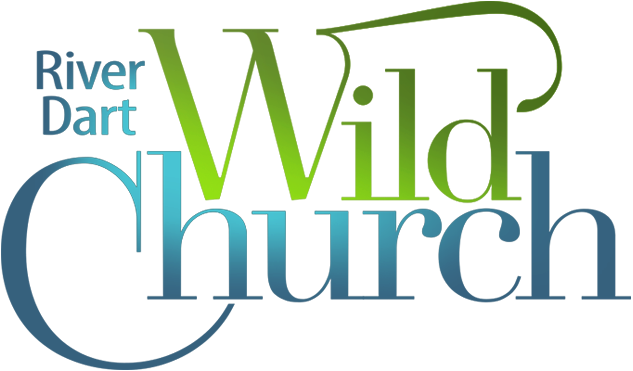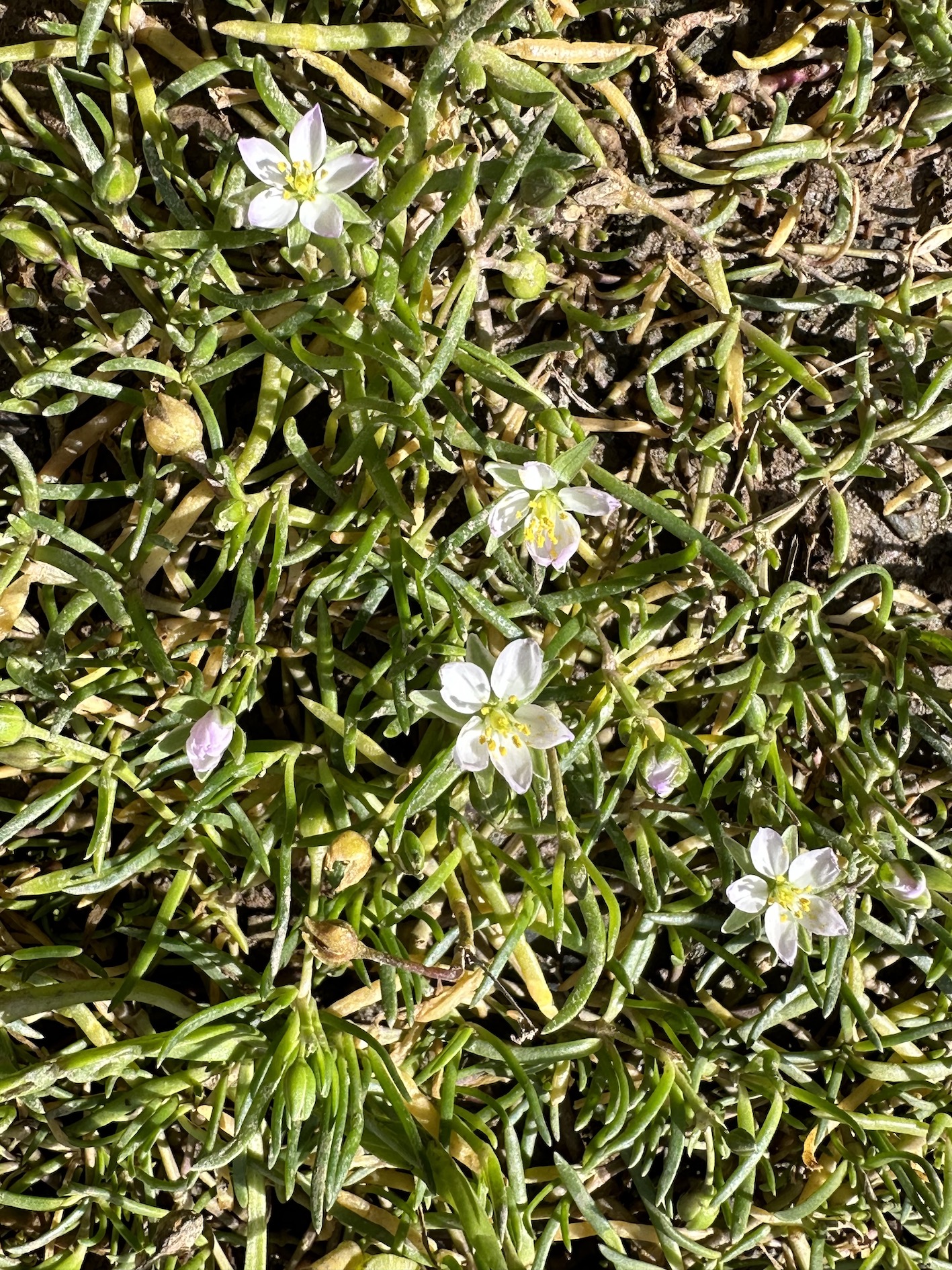The first Sunday of August saw our wild church back on pilgrimage again, for the second stage of the return to our signature ‘sea to source’ River Dart Way. This time we travelled by foot alongside the water rather than by canoe, as we journeyed from the Ham at Dittisham to the churchyard of St Peter’s in Cornworthy, meeting more saltmarsh along the Way. In terms of the seasons, we were now travelling through Lammastide, which is a time of celebrating the first fruits of the harvest and first signs of autumn. This Sunday was also the Feast of the Transfiguration for many Christians, with its themes of transformation and enlightenment. For me it became sea spurrey Sunday, after a memorable moment of spotting its starry flowers among the mud of the saltmarsh on Mill Creek: there was something about seeing stars in the muddy margins that spoke to me of the magic of wild church…
(You can read a short version of this journal post, with photos, on facebook here.)
We began to gather on the stony shore on the edge of the riverside at Dittisham with our guide for the afternoon, Isabel Carlisle, co-founder of the Bioregional Learning Centre and the Saltmarsh Project. She invited us to widen our thinking across the bioregion and whole watershed of the Dart and to imagine the bigger systems and movements of tides, weather, winds and more… many of which are changing in ways which we humans have disturbed and then find disturbing. These themes were beautifully reflected in an opening poem Isabel read by Rilke:
Go to the Limits of Your Longing
God speaks to each of us as (s)he makes us,
then walks with us silently out of the night.
These are the words we dimly hear:
You, sent out beyond your recall,
go to the limits of your longing.
Embody me.
Flare up like a flame
and make big shadows I can move in.
Let everything happen to you: beauty and terror.
Just keep going. No feeling is final.
Don’t let yourself lose me.
Nearby is the country they call life.
You will know it by its seriousness.
Give me your hand.
Translated and read by Joanna Macy
Then during our initial contemplative ‘inner gathering’ and ‘opening the senses’ we listened to pop and flow of air and water in the mudflats, touched its strange, silky surface, breathed in the scent and taste of salt and rot, and finally opened our eyes to all the life around us. Soon we were setting off up the hill and through the churchyard of St George’s, where we paused again among the gravestones and under the clocktower for more poetry by Rilke. I was struck by one particular stone memorial featuring a golden lichened angel, pointing upwards into the striking swirl of clouds and sunlight:
The hour is striking so close above me
The hour is striking so close above me,
so clear and sharp,
that all my senses ring with it.
I feel it now: there’s a power in me
to grasp and give shape to my world.
I know that nothing has ever been real
without my beholding it.
All becoming has needed me.
My looking ripens things
and they come toward me, to meet and be met.
English version by Anita Barrows and Joanna Macy
Original Language German
Moving through the lychgate, we then wandered down a picturesque street of colourful cottages and down a narrow path to the shore along Mill Creek. The tide was low and the water just a winding channel between great banks of grey-brown mud. Here we paused again for our first encounter for this Sunday with saltmarsh, in the form of fragile pockets of muddy, marginal plants. How easy it is to overlook and to trample them, unaware of their vulnerability and significance as an ecosystem… Yet attended to more carefully and consciously the saltmarsh reveals treasures, including that starry flowered sea spurrey and (a little further upstream) the pale purple blooms of sea aster.
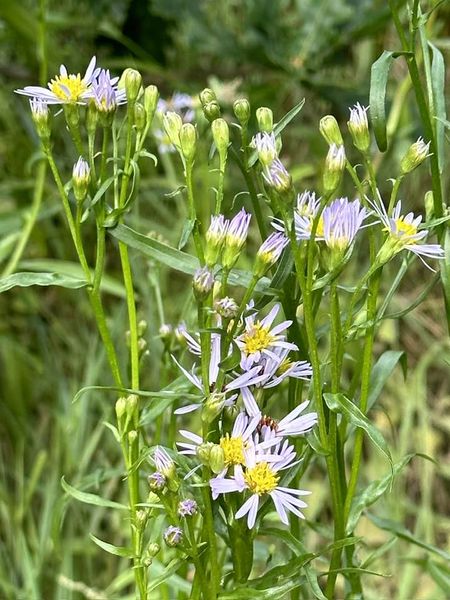
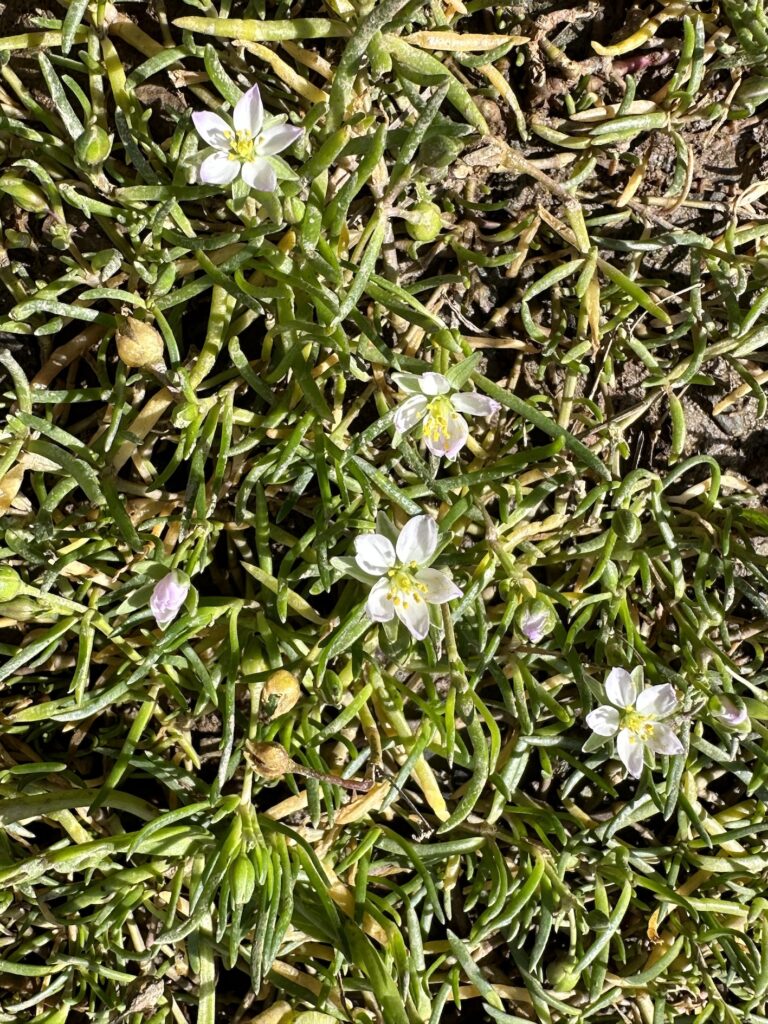
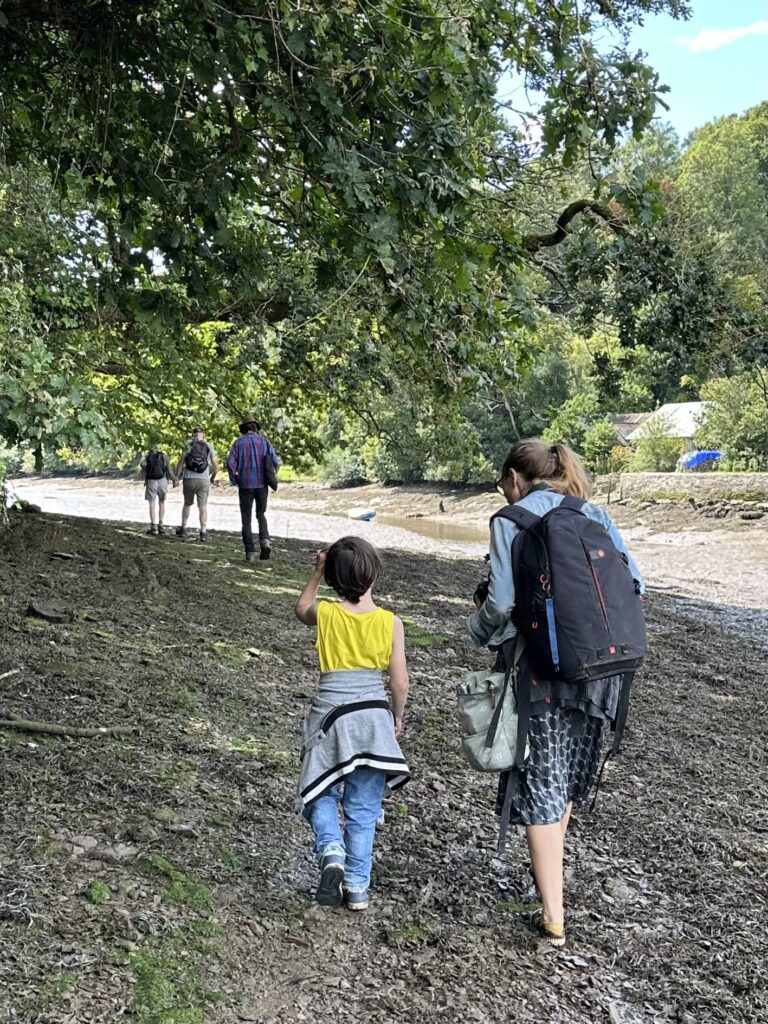
Leaving the saltmarsh behind we then crossed the rapidly narrowing, freshwater flow of the creek and climbing up into meadows and woodland, as we headed towards East Cornworthy. Lingering at the back of our pilgrim line, as we walked the length of the fields above the old mill, I was struck again by the drama of the vast cloudscape above us and how small we truly are among these ‘big systems’ of earth, water and sky. It was both a sobering and inspiring moment. Equally moving was the glimpse of a heron beside the stream as we wandered through a long, leafy lane in the woods. It suddenly unfurled its wide wings and lifted slowly up and away into the heavens.
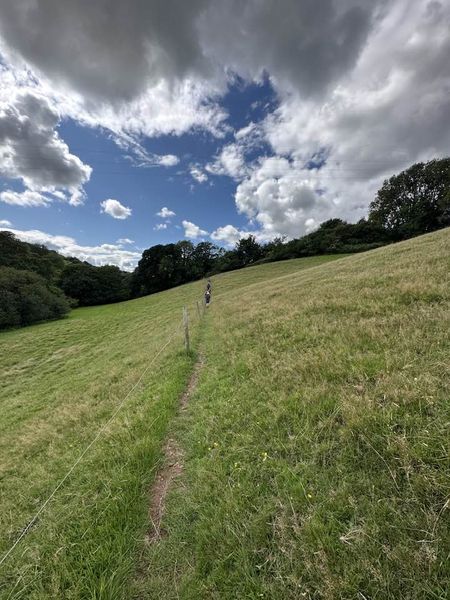
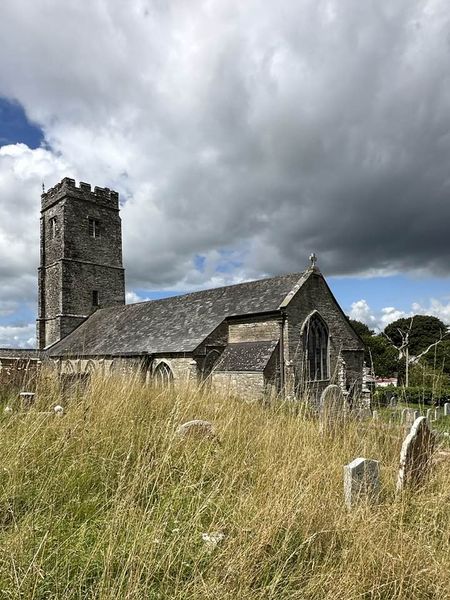
Our next pause came just as we reached the road and before beginning the long climb along the ridge that leads towards Cornworthy. It was good to stop for refreshments and sit quietly together among the meadow grasses and insects, including many beautiful butterflies on a gate-side buddleia bush. As we sat on the good earth, we also listened to our third Rilke poem:
Dear Darkening Ground
Dear darkening ground,
you’ve endured so patiently the walls we’ve built,
perhaps you’ll give the cities one more hour
and grant the churches and cloisters two.
And those that labor—let their work
grip them another five hours, or seven,
before you become forest again, and water, and widening wilderness
in that hour of inconceivable terror
when you take back your name
from all things.
Just give me a little more time!
I want to love the things
as no one has thought to love them,
until they’re worthy of you and real.
Translated and read by Joanna Macy
Hearing these words, the story of Jesus and his companions climbing Mount Tabor towards a transformative ‘peak experience’ was in my mind as we set off up the steep hill. Since being in the graveyard and with this sacred story in my mind, I had been feeling how we walk in the footsteps of our ancestors, of those who have loved the places and beings we love… and how their loving and our loving helped conserve life, so it could continue to be loved by those to come. Is ecological crisis an expression of lack of love? Staggering up that steep hill, some of us were young, some feeling the stiffness of ageing and I think we all found it hard work… a process of sometimes keeping steadily on and sometimes needing to pause and wait for each other or for passing cars… I guess loving is like that too. Our pilgrim flock seemed to expand; gathering in greetings, looks shared with motorists and hands raised in thanks, and also gathering feathers and flowers from the hedge-banks… wild marjoram, mugwort and more. Periodically the narrow and steep sided, deep Devon lanes would suddenly open into gateways, revealing wide vistas of the meandering river. At times we could see towards our start point by the sea at Dartmouth, while also catching glimpses of our future journeys towards the source on Dartmoor. As we climbed higher, not only did the views open but the freshness of the wind joined the warmth of the sun, and so it did feel like something of a joyful peak experience as we crested the ridge and then started our final descent towards St. Peter’s.
Soon our journey for today was drawing towards a close as we sat in a circle in the churchyard. Just below us, by the church, there were bleached, long grasses and graves, full of butterflies and the song of crickets… our own ‘bright field’. While just above us was the whistle and swoop of swallows in the sunshine. Here we shared our silent communion, once again consecrating our bowl of wildflower gin together and then giving and receiving blessing around the circle. It’s always a particular pleasure when we open the silence after several hours together and share reflections from the journey. Some of us spoke of being touched by the sense of connection that had unfolded and I felt particularly grateful for the presence of young people, as we ended with a final poem by the Welsh poet R.S Thomas and a blessing:
The Bright Field
I have seen the sun break through
to illuminate a small field
for a while, and gone my way
and forgotten it. But that was the pearl
of great price, the one field that had
the treasure in it. I realise now
that I must give all that I have
to possess it. Life is not hurrying
on to a receding future, nor hankering after
an imagined past. It is the turning
aside like Moses to the miracle
of the lit bush, to a brightness
that seemed as transitory as your youth
once, but is the eternity that awaits you.
